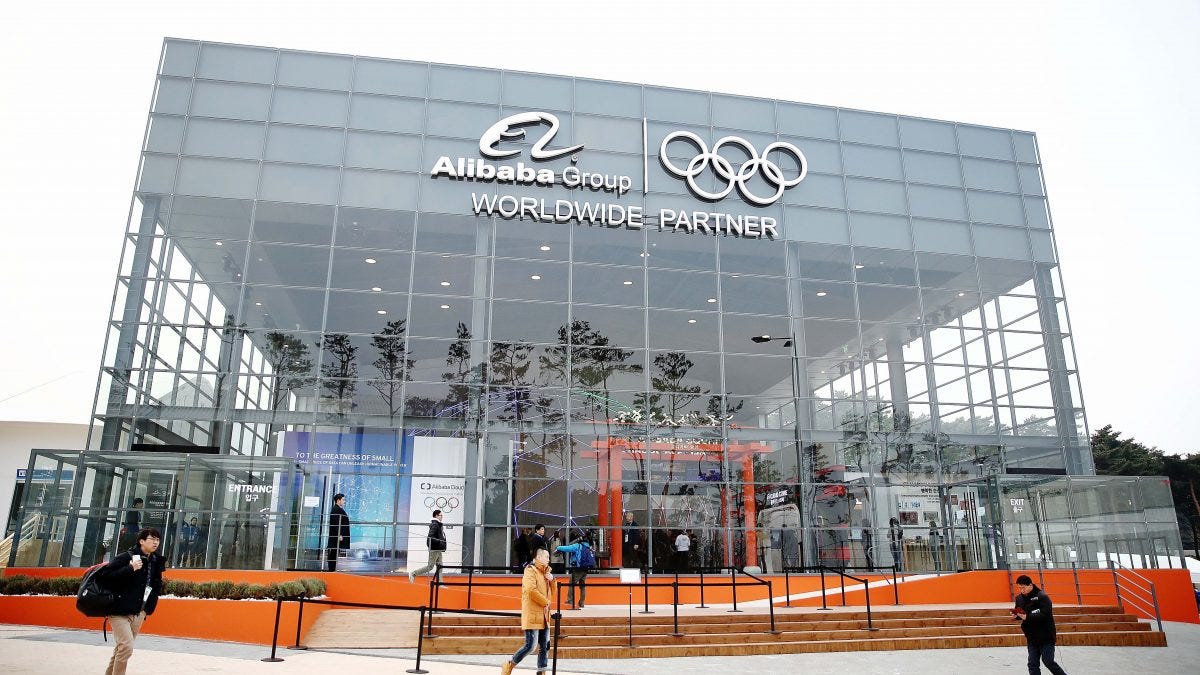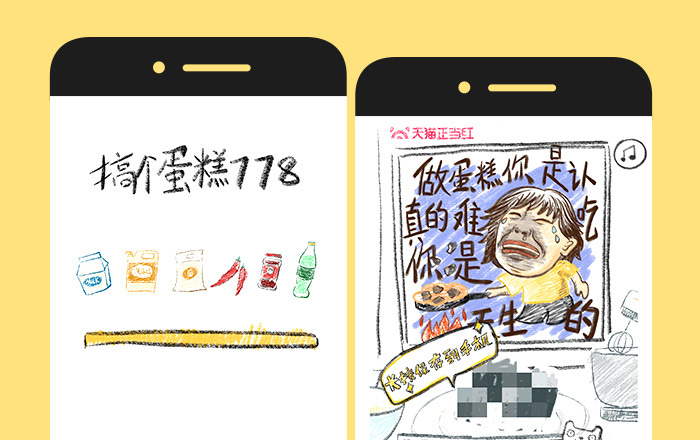Is the Cloud Content Revolution Here to Stay?
Plus: Social stress-baking, Olympics boom goes bust, and a livestreamer marathon.

Previous articles in our series on lessons to be learned from China’s COVID-19 experience have addressed brand action and communication during the pandemic, and today we turn to content and opportunities for digital transformation. While the impulse to halt spending is strong in times of great uncertainty, brands should consider how they can act with flexibility to shift their budgets toward creating relevant digital content that can fill consumer needs and address their concerns.
As the severity of the crisis was revealed in China, entertainment and brand marketing activities took a backseat, and new campaigns that didn’t take the epidemic’s impact into account would have been perceived as tone-deaf or in poor taste. Soon enough though, several types of content emerged to take on pivotal roles during the early weeks of lockdown.
Mentioned in this week’s newsletter: Alibaba, Amazon, Bilibili, Blaupunkt, Calvin Klein, Chaumet, Disney, Douyin, Dove, Fila, Harbin Brewery, iQiyi, JD.com, Kuaishou, M&Ms, MAC Cosmetics, Midea, Nike, P&G, Pizza Hut, Shark, Wu Fang Zhai, Xigua Video.
Public Service, Education and “Edutainment”

Authorities ordered TV networks to increase their news programming on the outbreak and cut back on entertaining content, which put the Spring Festival holiday debuts of several new series on hold. Public service announcements and educational content were seen across TV, video streaming sites and short video platforms, and in some cases sponsored directly by brands. For example, Procter & Gamble worked with JD.com’s livestreaming platform to host a regular broadcast featuring P&G scientists and medical specialists discussing virus protection and other topics.
Brands that took action in the national fight against the coronavirus with donations of cash and supplies were rewarded with free airtime on Shenzhen Satellite TV to publicize their efforts and share messages of support to viewers. A total of 91 brands signed up for the program, including Western names such as Pizza Hut, M&Ms and Abbott — for 15-second spots.
The outbreak also increased interest in medical films and shows, with the 2017 drama series “Emergency Physician” (急诊科医生) making a comeback on satellite networks and streaming video sites as it trending on Weibo for its storylines involving a coronavirus and quarantines. The documentary series “The Chinese Doctor” also found success via streaming after iQiyi picked it up and aired it in its entirety.
Platforms that could simultaneously offer information and entertainment, such as Douyin, Kuaishou and Bilibili, saw major gains during this period. Douyin and Kuaishou established dedicated channels and hashtags for updates, encouraging users to make donations through their e-commerce-enabled apps and developing additional programming, and Bilibili worked with the World Health Organization to establish a channel on its platform and connecting it with popular creators.
Xigua Video’s interactive Q&A program “Number One Hero” (头号英雄) ran a special episode on the coronavirus with help from the National Radio and Television Administration’s Internet Office. These platforms also gained additional traction by featuring amateur video and documentary-style footage from the epicenter of the outbreak in Wuhan (particularly footage of medical workers) and as sources of “homebody entertainment” — viral content on the creative ways that ordinary citizens found to pass the time during their mandatory “staycations.”
Charity Songs and Videos
China has a long tradition of using uplifting, propaganda-style content in times of crisis, and celebrities (many of whom are critical to brand marketing in China) became actively involved in these efforts. Singer Lay Zhang, who works with more than 30 brands in China and Asia including Chaumet, MAC Cosmetics, and Calvin Klein, even added an interactive element to the music game by inviting his fans to help write the lyrics for his song, “It Will Be Fine“ (会好的).
Megastar Jay Chou co-wrote a hit charity song performed by “God of Songs” Jacky Cheung. The video for the song racked up 80 million views within the first 24 hours of its release and gave Nike a subtle boost as well.
Many brands, most of them domestic, also started producing content, often paying tribute to workers on the front lines or aiming to uplift and inspire viewers.
Home appliance maker Midea released a video for a song it produced to honor frontline medical workers and noting its donations, which have included RMB 100 million in cash along with 4.5 million masks and 100 air-conditioning units.
Grocery app Miss Fresh (Meiri Youxian) made a short documentary about its delivery staff, who were in high demand during the outbreak, as the company saw a more than three-fold increase in year-on-year revenues during the Spring Festival holiday period.
Kitchen appliance brand Fotile canceled a planned Spring Festival celebration to mark 18 years of working with creative agency SGAD, opting instead to share a documentary of footage it compiled of people cooking at home during the outbreak.
Personal care brand Dove released an illustrated series, “You Are More Beautiful With Short Hair,” celebrating “authentic beauty” and offering another take on a controversial practice of shaving the heads of female medical personnel.
Valentine’s Day fell while many Chinese were still under home quarantine, and sports brand Fila sought to address the resulting strain on romantic relationships. The brand created a short film in collaboration with the Chinese edition of Harper’s Bazaar about a couple’s first encounter and followed up with a collection of images of 193 couples and a Weibo forum and interactive game to connect long-distance partners.
The Cloud Content Revolution

The biggest buzzword to emerge in Chinese media during the Covid-19 epidemic was “cloud,” denoting the new ways in which housebound Chinese could engage with the outside world, from work and school to entertainment and commerce.
The “cloud entertainment” trend started with Hunan TV’s creative efforts to salvage some its scheduled reality programming by creating livestreamed versions of some of its popular shows, with celebrities hosts broadcasting from their homes and guests participating via video conference. Bilibili took the initiative on the music front, working with indie music label Modern Sky to recreate a version of its popular Strawberry Music Festival series online.
Other platforms followed suit in offering similar types of programming along with expansions into other areas such as DJ parties, esports, museum tours and travel.
Cloud content can offer an important route for brands to reach housebound consumers who are hungry for new types of entertainment, yet there was relatively little sponsorship activity in this area. This may be partly the result of rapid turnaround and impromptu nature of the productions, and partly due to hesitation by brands to engage in overt promotional activities and their spending cuts in the face of looming uncertainties.
One notable exception was Hunan TV’s cloud version of its popular talk show “Day Day Up” (天天向上), which eventually drew eight brand sponsors, and one episode featured Shark’s sterilizing steam mop among several products demonstrated by top livestreamer Viya during a segment focused on cleaning products.
A more developed campaign was launched by Harbin Brewery, a subsidiary of Anheuser–Busch InBev, which used its strategic partnership with League of Legends to host an online event to mark the end of the Spring Festival holiday via game-streaming platform Douyu, with three popular streaming hosts encouraging viewers to join them in a “cloud” toast with Harbin Beer. That event drew more than 1.5 million viewers.
It’s worth noting that Harbin parent ABI had already donated RMB 10 million ($1.4 million) to support the fight against the coronavirus, allowing Harbin Brewery to build additional brand equity with more lighthearted entertainment.
Olympics Postponement Hits Alibaba and Streaming Video Content

The postponement of the 2020 Tokyo Summer Olympics in Tokyo is a big hit for the 60-plus official brand partners that committed more than $3 billion to sponsor the event. Among the biggest names left hanging is Alibaba, which reportedly beat out Amazon for a multi-year, top-tier sponsorship deal to be the cloud and e-commerce service partner for the games, at a cost of at least $800 million.
Alibaba’s involvement looked to span the range of the tech giant’s offerings, from official Tmall stores and shopping campaigns to Olympics-related shows on Youku to working with the International Olympics Committee on online broadcasts.
Its high-profile status as the only Chinese brand among the top level of global sponsors would have raised awareness of the brand globally and aided in expansion efforts, while also intending to “upgrade the games” through technology such as cloud computing and AI.
Some of Alibaba’s Olympic campaigns had already been launched. For example, in January the “Alibaba Cloud Gallery” was unveiled at Narita Airport in Tokyo to showcase local artists on digital screens, and Alibaba was also part of an interactive social media campaign to promote the creation of user-generated music videos that would play during the Games.
The Olympics content boom goes bust: Although the state-run CCTV network holds exclusive rights to broadcast the Games in China, satellite networks and video streaming platforms had at least 16 reality shows on the schedule that were tied to the Olympics. Alibaba’s Youku led the pack with five, while Tencent Video had three and iQiyi two. Some of the series may be reworked to run without the Olympics (though perhaps with less interest from viewers as a result) and others may be postponed until next year, but it still leaves a lot of uncertainty for the brand sponsors of the shows.
With a deal that will run through the 2028 Summer Olympics, Alibaba is still in a better position than smaller brands that had contracts tied to the Olympic Games taking place in 2020 and may require renegotiation to extend.
Trending on Tmall: Stress-Baking Gets Social

In China as in the United States, cooking has emerged as a top leisure activity during self-quarantine, and food-related content has been among the most searched on various platforms such as Douyin and Bilibili. Topping the list were searches for how to make a cake using a rice cooker, since relatively few Chinese have Western-style ovens in their homes.
Tmall tapped into this trend earlier this month with a multichannel campaign called “Bake a Cake 778” (搞点蛋糕778) — the “778” sounds like “eat up” (吃吃吧) in Mandarin.
Several kitchen appliance brands participated in the campaign, Midea and Casdon among them, allowing them to highlight their small-capacity ovens and other baking equipment. Midea launched a challenge on Douyin that gave participants discount coupons and an opportunity to win a full suite of baking equipment, while Casdon created a food video and photo “cloud” exhibition on Douyin, inviting users to share their baking techniques and awarding prizes to the most creative and highest-quality content.
The German kitchen appliance brand Blaupunkt also sponsored several food vloggers who joined in the campaign.
Tmall created an interactive mobile game for users to “make a cake” that incorporates visual styles, slang and memes popular among younger audiences, allowing them to play with various ingredients and cooking techniques and share their unique creations.
In addition to promotion from brands, several influencers with huge followings were engaged to share the “bake a cake 778” hashtag on Weibo. So far it has been viewed more than 240 million times, with 67,000 posts — many featuring user photos of their work in the kitchen.
Brand Film Pick: How an Old-School Brand Wins at Youth Culture

A 99-year-old brand best known for traditional sticky rice dumplings may not sound like a hotbed of creativity, but packaged-food producer Wu Fang Zhai has been at the forefront of both product innovation and developing appealing content for its promotion.
Over the past few years, Wu Fang Zhai has introduced an array of unusual new products, such as kimchi and cheese dumplings and crawfish-filled mooncakes, along with IP-driven collaborations with Disney featuring Mickey Mouse, Star Wars, various Disney princesses, and Marvel characters. These new products are often released as limited editions around Chinese holidays such as the Dragon Boat Festival, which adds to their appeal and helps draw widespread attention on social media.
The brand has also emerged as a leader in the area of branded video, establishing its own studio, Wu Fang Film, to develop and produce content, with recent offerings including a retro sci-fi film, a surreal journey by actors dressed as grains of rice, and a nostalgic nod to the traditional art of paper-cutting.
To promote a green rice flour dumpling known as qingtuan (青团) ahead of the upcoming Qing Ming holiday on April 4, the brand released a series of ten short animated clips, each promoting a lifestyle habit such as “doing exercise” and “having fun, but making time for yourself.” The suggestions are presented in a manner that’s sensitive to the concerns of consumers slowly emerging from the threat of the coronavirus epidemic, employing a humorous and uplifting tone to get the message across.
Each clip uses a distinct animation style to depict the dumpling characters, encouraging viewers to stay tuned to see what is next, while using repetitive music and the same slogan (“natural flavor qingtuan is tasty”) to link the segments and establish the “brainwashing” effect that is popular in Chinese advertising. Wu Fang Zhai also released a set of emojis for the animated figures that viewers can use and share via social media, adding an interactive element to the production.
News in English

Super livestreamer Li Jiaqi conducted a 2.5-hour broadcast for charity to promote products from Hubei ranging from snacks to skincare, drawing an audience of 13 million. Sixth Tone
The discount-oriented e-commerce platform Pinduoduo got a cultural upgrade with a series of livestream tours of venerable institutions including New York City’s Metropolitan Museum of Art, which were linked to sales of souvenirs and other cultural products. KrAsia
Will virtual reality finally go mainstream now that more and more people are confined to their homes? Abacus
Though e-commerce livestreaming can offer big opportunities for brands, it’s not without a number of drawbacks. Parklu
A guide to using WeChat for luxury brands in a post-coronavirus China. Business of Fashion
Thanks to the strong presence of beauty brands on digital channels in China, that sector suffered less than others during the country’s coronavirus lockdown. WWD
“Mulan” star Liu Yifei finds herself at the center of controversy again. The actress has been much in demand as an ambassador for global luxury brands, but a recent reference to herself as “Asian” has Chinese fans questioning her loyalty to the motherland. Radii
We’ve Got China Covered
China Film Insider: 988 Entertainment Companies Dissolved in Two Months
Jing Daily: The Rise of the Chinese Celebrities Fighting Covid-19
Jing Travel: Special Report: Chinese Museum Digital Strategies During Coronavirus
Thank you for reading! We’ll be back Thursday with more news and Report Corner. Until then, if you like what we’re doing, please share with a friend or colleague. Stay safe!


